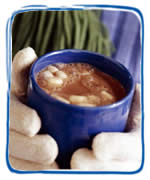Winter Weather: Indoor Safety
Highlights
- Use fireplace, wood stoves, or other combustion heaters only if they are properly vented to the outside and do not leak flue gas into the indoor air space.
- Never use a charcoal or gas grill indoors—the fumes are deadly.
- Never leave lit candles unattended.
- Keep as much heat as possible inside your home.
- Check the temperature in your home often during severely cold weather.
- Leave all water taps slightly open so they drip continuously.
- Eat well-balanced meals to help you stay warmer.
Heat Your Home Safely
If you plan to use a wood stove, fireplace, or space heater, be extremely careful. Follow the manufacturer’s instructions and remember these safety tips:
- Use fireplace, wood stoves, or other combustion heaters only if they are properly vented to the outside and do not leak flue gas into the indoor air space.
- Do not burn paper in a fireplace.
- Ensure adequate ventilation if you must use a kerosene heater.
- Use only the type of fuel your heater is designed to use—don’t substitute.
- Do not place a space heater within 3 feet of anything that may catch on fire, such as drapes, furniture, or bedding, and never cover your space heater.
- Never place a space heater on top of furniture or near water.
- Never leave children unattended near a space heater.
- Make sure that the cord of an electric space heater is not a tripping hazard but do not run the cord under carpets or rugs.
- Avoid using extension cords to plug in your space heater.
- If your space heater has a damaged electrical cord or produces sparks, do not use it.
- Store a multipurpose, dry-chemical fire extinguisher near the area to be heated.
- Protect yourself from carbon monoxide (CO) poisoning by installing a battery-operated CO detector and never using generators, grills, camp stoves, or similar devices indoors.
 Cook Safely
Cook Safely
- Never use a charcoal or gas grill indoors—the fumes are deadly.
- Never use an electric generator indoors, inside the garage, or near the air intake of your house because of the risk of carbon monoxide poisoning.
- Plug in appliances to the generator using individual heavy-duty, outdoor-rated cords.
- Do not use the generator or appliances if they are wet because of the risk of electrocution.
- Do not store gasoline indoors where the fumes could ignite.
Light Your Home Safely
If there is a power failure:
- Use battery-powered flashlights or lanterns rather than candles, if possible.
- Never leave lit candles unattended.
Conserve Heat
You may need fresh air coming in for your heater or for emergency cooking arrangements. However, if you don’t need extra ventilation, keep as much heat as possible inside your home. Avoid unnecessary opening of doors or windows. Close off unneeded rooms, stuff towels or rags in cracks under doors, and close draperies or cover windows with blankets at night.
Monitor Body Temperature
Infants less than one year old should never sleep in a cold room because (1) infants lose body heat more easily than adults; and (2) unlike adults, infants can’t make enough body heat by shivering. Provide warm clothing for infants and try to maintain a warm indoor temperature. If the temperature cannot be maintained, make temporary arrangements to stay elsewhere. In an emergency, you can keep an infant warm using your own body heat. If you must sleep, take precautions to prevent rolling on the baby. Pillows and other soft bedding can also present a risk of smothering; remove them from the area near the baby.
Older adults often make less body heat because of a slower metabolism and less physical activity. If you are over 65 years of age, check the temperature in your home often during severely cold weather. Also, check on elderly friends and neighbors frequently to ensure that their homes are adequately heated.
Keep a Water Supply
Extreme cold can cause water pipes in your home to freeze and sometimes rupture. When very cold temperatures are expected:
- Leave all water taps slightly open so they drip continuously.
- Keep the indoor temperature warm.
- Improve the circulation of heated air near pipes. For example, open kitchen cabinet doors beneath the kitchen sink.
If your pipes do freeze, do not thaw them with a torch. Instead, thaw them slowly by directing the warm air from an electric hair dryer onto the pipes.
If you cannot thaw your pipes, or the pipes are ruptured, use bottled water or get water from a neighbor’s home. As an emergency measure—if no other water is available—snow can be melted for water. Bringing water to a rolling boil for one minute will kill most microorganisms or parasites that may be present, but won’t remove chemical pollutants sometimes found in snow.
Eat and Drink Wisely
Eating well-balanced meals will help you stay warmer. Do not drink alcoholic or caffeinated beverages—they cause your body to lose heat more rapidly. Instead, drink warm, sweet beverages or broth to help maintain your body temperature. If you have any dietary restrictions, ask your doctor.
Learn More: Outdoor Safety
Contact Us:
- Centers for Disease Control and Prevention
1600 Clifton Rd
Atlanta, GA 30333 - 800-CDC-INFO
(800-232-4636)
TTY: (888) 232-6348 - Contact CDC-INFO







